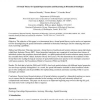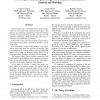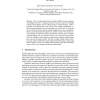102 search results - page 10 / 21 » Two Reasoning Methods for Extended Fuzzy ALCH |
IJCAI
2003
13 years 8 months ago
2003
Temporal Constraint Satisfaction Problems allow for reasoning with events happening over time. Their expressiveness has been extended independently in two directions: to account f...
ARTMED
2006
13 years 6 months ago
2006
Objective: The objective of this paper is to demonstrate how a formal spatial theory can be used as an important tool for disambiguating the spatial information embodied in biomed...
FSKD
2007
Springer
13 years 10 months ago
2007
Springer
The uncertainty may be divides it into two major groups, "objective uncertainty" and "subjective uncertainty". The objective uncertainty has already been exten...
SAT
2005
Springer
14 years 6 days ago
2005
Springer
Solvers for Quantified Boolean Formulae (QBF) use many analogues of technique from SAT. A significant amount of work has gone into extending conflict based techniques such as co...
ECSQARU
2001
Springer
13 years 11 months ago
2001
Springer
New semantics for numerical values given to possibility measures are provided. For epistemic possibilities, the new approach is based on the semantics of the transferable belief m...



